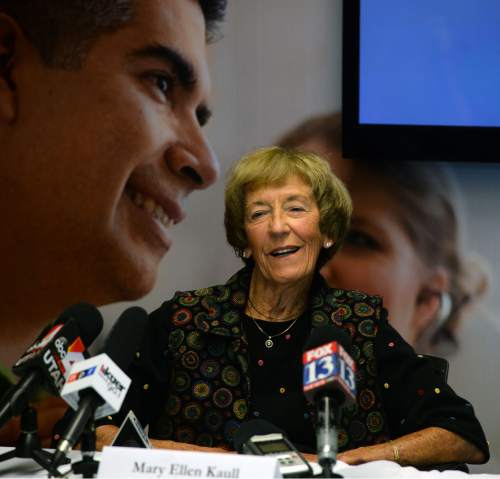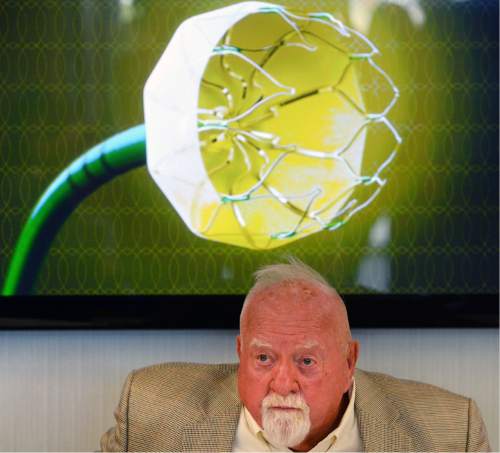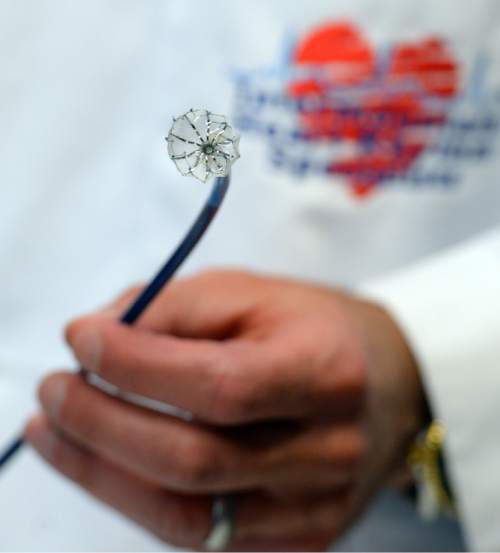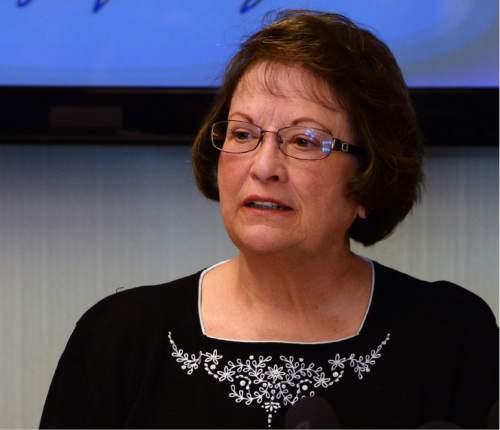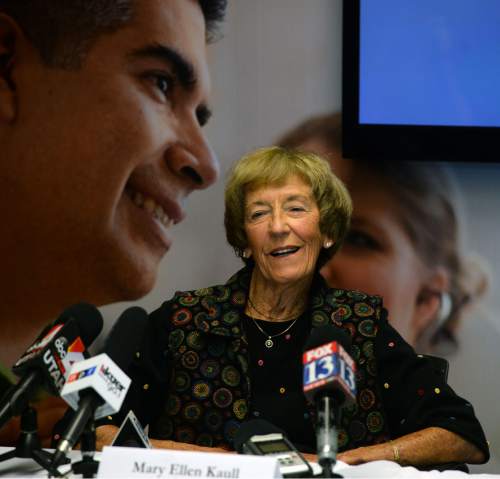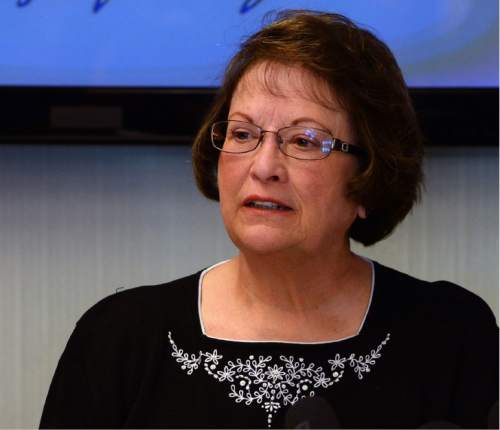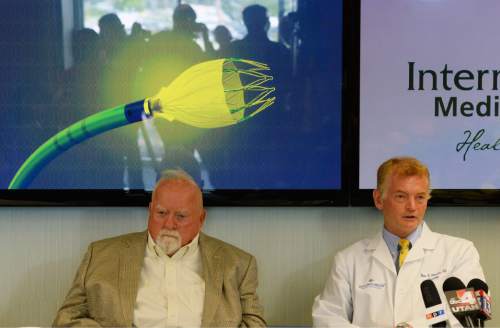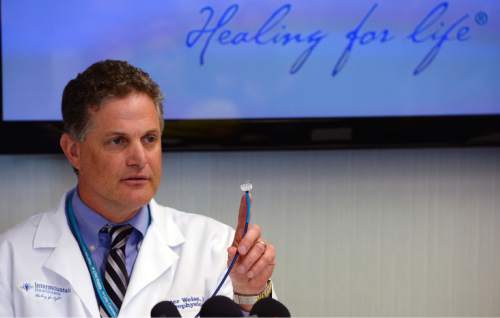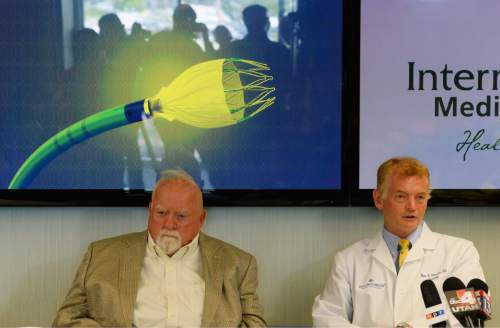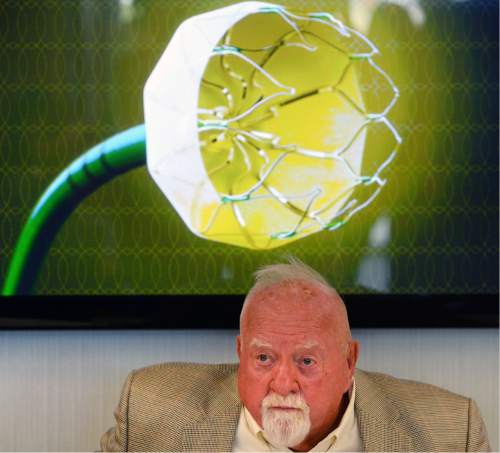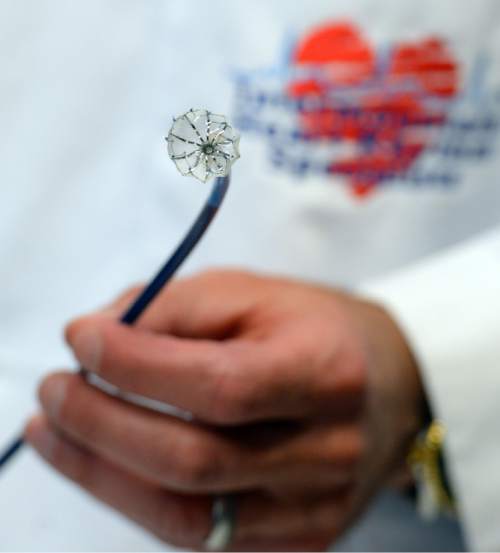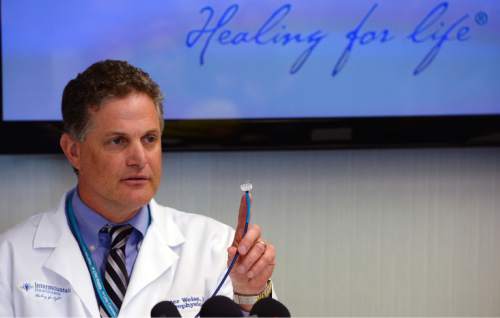Steve Griffin / The Salt Lake Tribune
Device recipient Mary Ellen Kaull talks about the Watchman left atrial appendage closure de
Steve Griffin / The Salt Lake Tribune
Device recipient Wilford Brimley talks about the Watchman left atrial appendage closure dev
Steve Griffin / The Salt Lake Tribune
Intermountain Medical enter Heart Institute cardiologist Pete Weiss, MD, talks about the Wa
Steve Griffin / The Salt Lake Tribune
Device recipient Marcia Swenson talks about the Watchman left atrial appendage closure devi
Steve Griffin / The Salt Lake Tribune
Device recipient Mary Ellen Kaull talks about the Watchman left atrial appendage closure de
Steve Griffin / The Salt Lake Tribune
Device recipient Marcia Swenson talks about the Watchman left atrial appendage closure devi
Steve Griffin / The Salt Lake Tribune
Intermountain Medical enter Heart Institute cardiologist Brian Whisenant, MD, right, and pa
Steve Griffin / The Salt Lake Tribune
Intermountain Medical enter Heart Institute cardiologist Pete Weiss, MD, talks about the Wa
Steve Griffin / The Salt Lake Tribune
Intermountain Medical enter Heart Institute cardiologist Brian Whisenant, MD, right, and pa
Steve Griffin / The Salt Lake Tribune
Device recipient Wilford Brimley talks about the Watchman left atrial appendage closure dev
Steve Griffin / The Salt Lake Tribune
Intermountain Medical enter Heart Institute cardiologist Pete Weiss, MD, talks about the Wa
Steve Griffin / The Salt Lake Tribune
Intermountain Medical enter Heart Institute cardiologist Pete Weiss, MD, talks about the Wa
Steve Griffin / The Salt Lake Tribune
Device recipient Mary Ellen Kaull talks about the Watchman left atrial appendage closure device, a life-saving and heart-preserving cardiac device that has been tested extensively in clinical trials by scientists and cardiologists at the Intermountain Medical Center Heart Institute in Murray. The device will be available this month, for the first time, to all eligible Utah patients for widespread clinical care outside of the research arena. The device is the first and only one of its kind available in the United States. The Intermountain Medical Center Heart Institute has been one of the leading national research sites, and is the first and only Utah hospital authorized to implant the device at this point. The device was introduced at a press conference at the Intermountain Medical Center Doty Education Center in Murray, Utah Monday May 16, 2016.
Steve Griffin / The Salt Lake Tribune
Device recipient Wilford Brimley talks about the Watchman left atrial appendage closure device, back, a life-saving and heart-preserving cardiac device that has been tested extensively in clinical trials by scientists and cardiologists at the Intermountain Medical Center Heart Institute in Murray. The device will be available this month, for the first time, to all eligible Utah patients for widespread clinical care outside of the research arena. The device is the first and only one of its kind available in the United States. The Intermountain Medical Center Heart Institute has been one of the leading national research sites, and is the first and only Utah hospital authorized to implant the device at this point. The device was introduced at a press conference at the Intermountain Medical Center Doty Education Center in Murray, Utah Monday May 16, 2016.
Steve Griffin / The Salt Lake Tribune
Intermountain Medical enter Heart Institute cardiologist Pete Weiss, MD, talks about the Watchman left atrial appendage closure device, back, a life-saving and heart-preserving cardiac device that has been tested extensively in clinical trials by scientists and cardiologists at the Intermountain Medical Center Heart Institute in Murray. The device will be available this month, for the first time, to all eligible Utah patients for widespread clinical care outside of the research arena. The device is the first and only one of its kind available in the United States. The Intermountain Medical Center Heart Institute has been one of the leading national research sites, and is the first and only Utah hospital authorized to implant the device at this point. The device was introduced at a press conference at the Intermountain Medical Center Doty Education Center in Murray, Utah Monday May 16, 2016.
Steve Griffin / The Salt Lake Tribune
Device recipient Marcia Swenson talks about the Watchman left atrial appendage closure device, a life-saving and heart-preserving cardiac device that has been tested extensively in clinical trials by scientists and cardiologists at the Intermountain Medical Center Heart Institute in Murray. The device will be available this month, for the first time, to all eligible Utah patients for widespread clinical care outside of the research arena. The device is the first and only one of its kind available in the United States. The Intermountain Medical Center Heart Institute has been one of the leading national research sites, and is the first and only Utah hospital authorized to implant the device at this point. The device was introduced at a press conference at the Intermountain Medical Center Doty Education Center in Murray, Utah Monday May 16, 2016.
Steve Griffin / The Salt Lake Tribune
Device recipient Mary Ellen Kaull talks about the Watchman left atrial appendage closure device, a life-saving and heart-preserving cardiac device that has been tested extensively in clinical trials by scientists and cardiologists at the Intermountain Medical Center Heart Institute in Murray. The device will be available this month, for the first time, to all eligible Utah patients for widespread clinical care outside of the research arena. The device is the first and only one of its kind available in the United States. The Intermountain Medical Center Heart Institute has been one of the leading national research sites, and is the first and only Utah hospital authorized to implant the device at this point. The device was introduced at a press conference at the Intermountain Medical Center Doty Education Center in Murray, Utah Monday May 16, 2016.
Steve Griffin / The Salt Lake Tribune
Device recipient Marcia Swenson talks about the Watchman left atrial appendage closure device, a life-saving and heart-preserving cardiac device that has been tested extensively in clinical trials by scientists and cardiologists at the Intermountain Medical Center Heart Institute in Murray. The device will be available this month, for the first time, to all eligible Utah patients for widespread clinical care outside of the research arena. The device is the first and only one of its kind available in the United States. The Intermountain Medical Center Heart Institute has been one of the leading national research sites, and is the first and only Utah hospital authorized to implant the device at this point. The device was introduced at a press conference at the Intermountain Medical Center Doty Education Center in Murray, Utah Monday May 16, 2016.
Steve Griffin / The Salt Lake Tribune
Intermountain Medical enter Heart Institute cardiologist Brian Whisenant, MD, right, and patient Wilford Brimley talk about the Watchman left atrial appendage closure device, back, a life-saving and heart-preserving cardiac device that has been tested extensively in clinical trials by scientists and cardiologists at the Intermountain Medical Center Heart Institute in Murray. The device will be available this month, for the first time, to all eligible Utah patients for widespread clinical care outside of the research arena. The device is the first and only one of its kind available in the United States. The Intermountain Medical Center Heart Institute has been one of the leading national research sites, and is the first and only Utah hospital authorized to implant the device at this point. The device was introduced at a press conference at the Intermountain Medical Center Doty Education Center in Murray, Utah Monday May 16, 2016.
Steve Griffin / The Salt Lake Tribune
Intermountain Medical enter Heart Institute cardiologist Pete Weiss, MD, talks about the Watchman left atrial appendage closure device, back, a life-saving and heart-preserving cardiac device that has been tested extensively in clinical trials by scientists and cardiologists at the Intermountain Medical Center Heart Institute in Murray. The device will be available this month, for the first time, to all eligible Utah patients for widespread clinical care outside of the research arena. The device is the first and only one of its kind available in the United States. The Intermountain Medical Center Heart Institute has been one of the leading national research sites, and is the first and only Utah hospital authorized to implant the device at this point. The device was introduced at a press conference at the Intermountain Medical Center Doty Education Center in Murray, Utah Monday May 16, 2016.
Steve Griffin / The Salt Lake Tribune
Intermountain Medical enter Heart Institute cardiologist Brian Whisenant, MD, right, and patient Wilford Brimley talk about the Watchman left atrial appendage closure device, back, a life-saving and heart-preserving cardiac device that has been tested extensively in clinical trials by scientists and cardiologists at the Intermountain Medical Center Heart Institute in Murray. The device will be available this month, for the first time, to all eligible Utah patients for widespread clinical care outside of the research arena. The device is the first and only one of its kind available in the United States. The Intermountain Medical Center Heart Institute has been one of the leading national research sites, and is the first and only Utah hospital authorized to implant the device at this point. The device was introduced at a press conference at the Intermountain Medical Center Doty Education Center in Murray, Utah Monday May 16, 2016.
Steve Griffin / The Salt Lake Tribune
Device recipient Wilford Brimley talks about the Watchman left atrial appendage closure device, back, a life-saving and heart-preserving cardiac device that has been tested extensively in clinical trials by scientists and cardiologists at the Intermountain Medical Center Heart Institute in Murray. The device will be available this month, for the first time, to all eligible Utah patients for widespread clinical care outside of the research arena. The device is the first and only one of its kind available in the United States. The Intermountain Medical Center Heart Institute has been one of the leading national research sites, and is the first and only Utah hospital authorized to implant the device at this point. The device was introduced at a press conference at the Intermountain Medical Center Doty Education Center in Murray, Utah Monday May 16, 2016.
Steve Griffin / The Salt Lake Tribune
Intermountain Medical enter Heart Institute cardiologist Pete Weiss, MD, talks about the Watchman left atrial appendage closure device, back, a life-saving and heart-preserving cardiac device that has been tested extensively in clinical trials by scientists and cardiologists at the Intermountain Medical Center Heart Institute in Murray. The device will be available this month, for the first time, to all eligible Utah patients for widespread clinical care outside of the research arena. The device is the first and only one of its kind available in the United States. The Intermountain Medical Center Heart Institute has been one of the leading national research sites, and is the first and only Utah hospital authorized to implant the device at this point. The device was introduced at a press conference at the Intermountain Medical Center Doty Education Center in Murray, Utah Monday May 16, 2016.
Steve Griffin / The Salt Lake Tribune
Intermountain Medical enter Heart Institute cardiologist Pete Weiss, MD, talks about the Watchman left atrial appendage closure device, back, a life-saving and heart-preserving cardiac device that has been tested extensively in clinical trials by scientists and cardiologists at the Intermountain Medical Center Heart Institute in Murray. The device will be available this month, for the first time, to all eligible Utah patients for widespread clinical care outside of the research arena. The device is the first and only one of its kind available in the United States. The Intermountain Medical Center Heart Institute has been one of the leading national research sites, and is the first and only Utah hospital authorized to implant the device at this point. The device was introduced at a press conference at the Intermountain Medical Center Doty Education Center in Murray, Utah Monday May 16, 2016.


